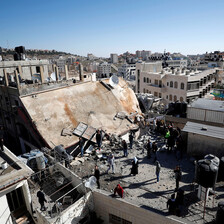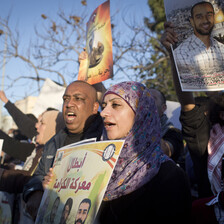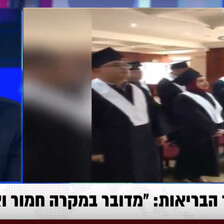The Electronic Intifada 30 June 2016

The mother of Murad Ideis, accused of stabbing and killing a woman living in a settlement in January, stands on the rubble of her home in Beit Amra after it was demolished by the Israeli army on 11 June.
APA imagesAmal Mukhamara is fed up with the questions. She is tired of journalists inquiring why her son Khaled and his cousin Muhammad killed four Israelis in Tel Aviv earlier this month. She is tired of being asked if she condemns their actions or if she knew of their plans beforehand.
“No mother will allow her son to put his life in danger,” she said. “But our sons do not ask us for our opinions or approval. They are driven to act because of all the injustice and aggression they have been subjected to by Israel.”
The killings took place in an upmarket Tel Aviv square. Both of the alleged attackers were wounded before being arrested.
Israel is using the Tel Aviv killings as a pretext to inflict more injustice and aggression on their family and neighbors in Yatta, a town near Hebron in the occupied West Bank.
Almost 300 members of the extended Mukhamara family had work or travel permits canceled by Israel after the killings, according to Jamal Bheis, deputy mayor of Yatta.
Since the killings occurred, Israel has subjected Yatta’s inhabitants to repeated raids, violent house searches and random arrests. All entrances to the city have been closed at times.
With Israel serving notice that it plans to demolish the home where nine members of Khaled’s family live, local residents have set up a protest tent. Regular visits to the family are being undertaken in order to demonstrate solidarity.
The family has moved furniture out of the building in anticipation of the possible demolition. Muhammad Musa Mukhamara, Khaled’s father, worked as a lawyer from home, but has been forced to find a new office. Last year he was diagnosed with Parkinson’s disease.
The Israeli government in 2015 decided to accelerate the demolition of homes where the families of Palestinians involved in armed resistance lived.
Such demolitions are part of a deliberate policy of collective punishment which Israel inflicts on Palestinians.
Such measures violate international law. The Fourth Geneva Convention states that nobody living under military occupation may be punished for something they have not done.
Yatta and other communities near Hebron have experienced collective punishment repeatedly. For example, Israeli forces set up checkpoints on the roads into Yatta following the outbreak of a Palestinian uprising in October 2015.
“Heavy price”
Many Palestinians believe that Israel regards collective punishment as a means of exerting pressure. By resorting to it, Israel may be trying to sow division among Palestinians.
Making communities suffer could be a tactic to try and turn Palestinians against those who resist the occupation. The Israeli military has stated as much: in 2014, it issued a warning that armed resistance “carries a heavy price.”
Rather than sowing division, however, the tactic has actually strengthened the sense of community in Yatta.
“These policies seek to crush any seed of resistance by making the entire community pay such a massive price,” Bheis noted. “But the response of the people of Yatta has been outstanding.”
It appears that most people in Yatta do not blame Khaled and Muhammad Mukhamara for Israel’s decision to close roads and withdraw travel and work permits. Instead, they have turned their wrath on the Israeli occupation.
“If permits will make us obedient servants of the occupation or come at the expense of our dignity, we do not want them,” said Rafat al-Adra, a volunteer at the Red Crescent humanitarian organization and a member of a group that rebuilds demolished homes in Yatta.
“The collective punishment to which they have subjected us has only increased the solidarity in the community,” he added.

Israeli soldiers on the streets of Yatta during an arrest raid on the village on 15 June.
APA imagesWadha Mukhamara, grandmother of Khaled and Muhammad, knows what it is like to wait for a demolition.
The 70-year-old woman still vividly remembers when Israeli forces bulldozed the home of her son Taleb back in 2003 after he and his brother carried out two separate attacks at the Ziv crossroads near Yatta in 2002. Both her sons — uncles of Khaled and Muhammad — were sentenced to life and their home was demolished, she said.
“I raised Khaled and Muhammad and felt they were my only solace after my two sons were imprisoned,” she said. “Now I will probably never see them again, just like I haven’t seen my sons since their imprisonment.”
Amal, Khaled’s mother, is in deep shock. She feels that time has frozen since she learned her son was involved in the Tel Aviv killings.
Khaled had been studying engineering in Jordan. He took a semester off in January, according to his mother.
“He told me that he wanted to work for a few months to raise money for his studies,” Amal said. His father had recently undergone an operation and the family was struggling to pay Khaled’s tuition fees and those of his sister, who was also attending university. “I was disappointed at the start because I wanted him to graduate, but I respected his decision.”
Khaled worked as a construction worker in Israel in recent months. His cousin Muhammad was also a construction worker.
More collective punishment
The Mukhamara family’s situation bears similarities to that of the Ideis family in Beit Amra, a village on the outskirts of Yatta.
Murad Ideis recently turned 16 under Israeli detention. He is accused of killing a woman in an Israeli settlement in the South Hebron Hills in January.
After that killing, the Ideis family received a demolition order from the Israeli authorities. They appealed against the order to the Israeli high court.
But the demolition went ahead.
“After what happened in Tel Aviv, we expected that the demolition would take place very soon,” Murad’s father, Badr Ideis, told The Electronic Intifada.
The demolition forced seven members of his family to find alternative accommodations through the help of their relatives, Badr said.
Before demolishing his home, Badr added, Israel canceled his work permit.
Prior to the revocation of his permit, Badr worked in tiling inside Israel. Israel routinely cancels work permits of Palestinians whose relatives are involved in attacks against Israelis.
Badr was given a part-time job in Yatta to support him after the ban. But the family is mainly relying on their savings to make ends meet.
“We are raising funds to build a house for him and for anyone affected by revenge demolitions,” said Rafat al-Adra, the Red Crescent volunteer. “But now we are looking for a suitable piece of land.”

An Israeli soldier grabs a Palestinian man as the army demolishes sheds on the pretext that they lack a building permit near Yatta village, 19 June.
APA imagesFinding land is a difficult task. Under the Oslo accords — signed between Israel and the Palestine Liberation Organization in the 1990s — the town of Yatta was designated as being part of Area A. That part of the West Bank is nominally under the control of the Palestinian Authority.
Yet many of the villages around Yatta are within Area C, a zone covering more than 60 percent of the West Bank which is under full Israeli administrative and military control.
Receiving a permit to build in Area C is virtually impossible for Palestinians. Nearly all applications are turned down by Israel.
Not only is Israel shrinking the amount of space available to Palestinians, it is actively displacing Palestinians and denying them their livelihoods. But not without resistance.
“Israeli soldiers know that if they come to demolish the home of the Mukhamaras, they will be met by fierce resistance,” said one Yatta resident, who spoke on condition of anonymity.
“We will not welcome with roses the bulldozers that come to destroy a home in our city. It’s great that people are donating to rebuild demolished homes, but we will also work to prevent the demolitions from taking place.”
Budour Youssef Hassan is a Palestinian writer and law graduate based in occupied Jerusalem. Blog: budourhassan.wordpress.com. Twitter: @Budour48





